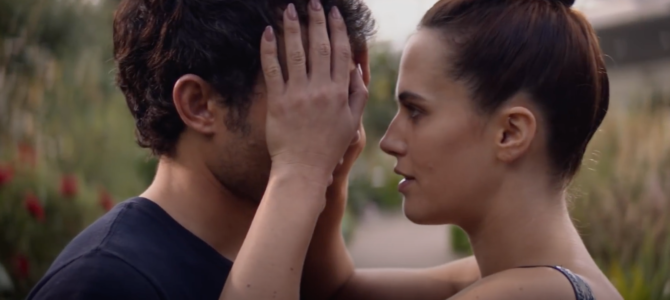
It’s been nearly two months since NBC launched its exclusive streaming platform Peacock, and its flagship original content, a big-budget adaptation of Aldous Huxley’s classic novel “Brave New World,” has been largely and unjustly overlooked.
The first two episodes of “Brave New World” are free to stream on Peacock, and a five-dollar subscription unlocks the other seven. It’s a small price to pay for one of the most engrossing and thought-provoking television shows of the year.
“Welcome to New London. We have three rules: No privacy. No family. No monogamy. Everyone is very happy,” is the title card of the first episode.
Set some 500 years in the future, a new civilization has risen from the ashes of an undisclosed calamity. London, as well as much of the world, has formed a strict, hierarchical system of genetically modified people to fill different roles in a society that values stability above all.
Emotional pain is a thing of the past with help from a mood-altering drug called Soma, which New Londoners take to subdue negative emotions as insignificant as an awkward encounter with co-workers to the life-altering trauma of watching a friend die. Likewise, citizens of this new society satisfy every bodily pleasure imaginable at nightly raves that turn into massive orgies.
An omniscient wireless network called Indra enforces the rules through contact lenses that connect to the user’s consciousness. They must be worn at all times. “If you’re not happy, you’re nothing at all,” and, “Everyone belongs to everyone else,” go the New London mantras.
To get a taste of “authenticity,” New Londoners travel to the Savage Reservation, an autonomous region in what used to be New Mexico that refused to connect to Indra and preserves aspects from the old world, like monogamy, family units, and struggles for survival. It also preserves the most base elements of middle America: it’s a visual wasteland of dusty Walmarts and trailer parks.
On a sightseeing trip to this Savage Reservation, our two New Londoner protagonists, the earnest and anxious counselor Bernard Marx (Harry Lloyd) and the free-spirited geneticist Lenina Crowne (Jessica Brown-Findlay), are caught in a violent rebellion and have to be saved by John the Savage (Alden Ehrenreich). Crowne and Marx escape with John back to New London, where his idealism, passion, and roguish charm begins to rub off on the inhabitants — especially the protagonists — to disastrous results.
John ignites those he meets with a longing for freedom and passion, even if that means sacrificing their drug-fueled contentment. His mere presence breaks through the Soma daze to expose the superficiality of New London and destabilizes the social hierarchy. The show ends ambiguously, but leaves open the possibility for a second season.
With a clearly high-dollar production value, the dystopian future “Brave New World” portrays feels both grounded and exotic. The set design of New London is bright and modern; it favors Brutalism, as if soft curves and bright spaces would distract from the fact that the city is actually a monolith of unyielding concrete and steel.
The character development is perhaps the strongest feature of the show’s writing. The seasoned cast has excellent chemistry and emotional depth. Harry Lloyd as Marx and Hannah John-Kamen as his best friend Helm Watson are especially delightful. Like Brown-Findlay’s breakout role as Sybil Crawley on “Downton Abbey,” Crowne is a spunky female lead, while Ehrenreich channels similar roguish energy to his role as Han Solo in “Solo: A Star Wars Story.”
Anyone looking for a faithful book-to-screen translation of Huxley’s 1931 prophetic novel will be disappointed. Others may appreciate the significant deviations from the source material, however, such as the disposal of Huxley’s cringeworthy (worship of Henry Ford) and problematic elements (overt racism and sexism). Although criticized for missing the point of the novel, one can still draw timely, if different, lessons from the show.
Part of the reason the show deviates so dramatically from the book is that too much of what Huxley predicted has already come to pass. Meaningless sex, in vitro fertilization, the breakdown of the family, and casual hedonism and nihilism are now the norm in many parts of our current society — not to mention the majority of our TV shows and movies.
The show is a stark reminder of the consequences of trying to establish heaven on earth. It launched during a national reckoning with race, during which many are calling for the abolition of our bulwark institutions. Christianity, the patriarchy, colonialism, the police, and even history itself have found themselves on trial before the mob in recent months, which places the blame for societal failings on anything but the individual.
“Brave New World” shows us a society in which all these demands are met. There’s no family, no religion, no criminals to punish, and no limits on sexuality so long as everyone shares their bodies with everyone else.
All that remains is a culture in stasis; no memory, no history, everyone safe, everyone happy. But instead of providing a stable and incorruptible social body, the things that allow a group of people to come together in community — such as romantic love, family, and common spiritual aspirations — become the sparks that set off its destruction.
The series raises the same question Huxley posed 90 years ago when he asked if man would exchange freedom for happiness. The answer is a resounding “no” — not because he shouldn’t, but because he can’t. Attempts to immanentize the eschaton are always met with failure because no system that denies human nature can last for long. If violence and cruelty are immutable, so too are the desires to love, to create, and to sacrifice.
“Brave New World” ultimately illustrates the deeply human need for something beyond the flesh and the lengths to which people will go to recognize their deepest longings. All the drugs and sex in the world can’t suppress this reality.
This article was first published in The Hillsdale Collegian.









